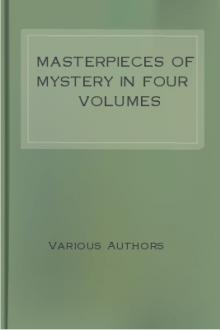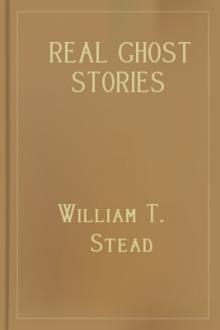Varney the Vampire; Or, the Feast of Blood by Prest and Rymer (ereader iphone .txt) 📗

- Author: Prest and Rymer
Book online «Varney the Vampire; Or, the Feast of Blood by Prest and Rymer (ereader iphone .txt) 📗». Author Prest and Rymer
Determination, however, will do wonders; and although the rioters numbered over forty, notwithstanding all their desertions, and not above seventeen or eighteen soldiers marched into the inn, we shall perceive that they succeeded in accomplishing their object without any manoeuvring at all.
The space in which the rioters were confined was low, narrow, and inconvenient, as well as dark, for the lights on the staircase cast up that height but very insufficient rays.
Weapons of defence they found but very few, and yet there were some which, to do them but common credit, they used as effectually as possible.
These attics, or lofts, were used as lumber-rooms, and had been so for years, so that there was a collection of old boxes, broken pieces of furniture, and other matters, which will, in defiance of everything and everybody, collect in a house.
These were formidable means of defence, if not of offence, down a very narrow staircase, had they been used with judgment.
Some of the rioters, who were only just drunk enough to be fool-hardy, collected a few of these articles at the top of the staircase, and swore they would smash anybody who should attempt to come up to them, a threat easier uttered than executed.
And besides, after all, if their position had been ever so impregnable, they must come down eventually, or be starved out.
But the soldiers were not at liberty to adopt so slow a process of overcoming their enemy, and up the second-floor staircase they went, with a determination of making short work of the business.
They paused a moment, by word of command, on the landing, and then, after this slight pause, the word was given to advance.
Now when men will advance, in spite of anything and everything, it is no easy matter to stop them, and he who was foremost among the military would as soon thought of hesitating to ascend the narrow staircase before him, when ordered so to do, as paying the national debt. On he went, and down came a great chest, which, falling against his feet, knocked him down as he attempted to scramble over it.
"Fire," said the officer; and it appeared that he had made some arrangements as to how the order was to be obeyed, for the second man fired his carbine, and then scrambled over his prostrate comrade; after which he stooped, and the third fired his carbine likewise, and then hurried forward in the same manner.
At the first sound of the fire arms the rioters were taken completely by surprise; they had not had the least notion of affairs getting to such a length. The smell of the powder, the loud report, and the sensation of positive danger that accompanied these phenomena, alarmed them most terrifically; so that, in point of fact, with the exception of the empty chest that was thrown down in the way of the first soldier, no further idea of defence seemed in any way to find a place in the hearts of the besieged.
They scrambled one over the other in their eagerness to get as far as possible from immediate danger, which, of course, they conceived existed in the most imminent degree the nearest to the door.
Such was the state of terror into which they were thrown, that each one at the moment believed himself shot, and the soldiers had overcome all the real difficulties in getting possession of what might thus be called the citadel of the inn, before those men who had been so valorous a short time since recovered from the tremendous fright into which they had been thrown.
We need hardly say that the carbines were loaded, but with blank cartridges, for there was neither a disposition nor a necessity for taking the lives of these misguided people.
If was the suddenness and the steadiness of the attack that had done all the mischief to their cause; and now, ere they recovered from the surprise of having their position so completely taken by storm, they were handed down stairs, one by one, from soldier to soldier, and into the custody of the civil authorities.
In order to secure the safe keeping of large a body of prisoners, the constables, who were in a great minority, placed handcuffs upon some of the most capable of resistance; so what with those who were thus secured, and those who were terrified into submission, there was not a man of all the lot who had taken refuge in the attics of the public-house but was a prisoner.
At the sound of fire-arms, the women who were outside the inn had, of course, raised a most prodigious clamour.
They believed directly that every bullet must have done some most serious mischief to the townspeople, and it was only upon one of the soldiers, a non-commissioned officer, who was below, assuring them of the innoxious nature of the proceeding which restored anything like equanimity.
"Silence!" he cried: "what are you howling about? Do you fancy that we've nothing better to do than to shoot a parcel of fellows that are not worth the bullets that would be lodged in their confounded carcases?"
"But we heard the gun," said a woman.
"Of course you did; it's the powder that makes the noise, not the bullet. You'll see them all brought out safe wind and limb."
This assurance satisfied the women to a certain extent, and such had been their fear that they should have had to look upon the spectacle of death, or of grievous wounds, that they were comparatively quite satisfied when they saw husbands, fathers, and brothers, only in the custody of the town officers.
And very sheepish some of the fellows looked, when they were handed down and handcuffed, and the more especially when they had been routed only by a few blank cartridges—that sixpenny worth of powder had defeated them.
They were marched off to the town gaol, guarded by the military, who now probably fancied that their night's work was over, and that the most turbulent and troublesome spirits in the town had been secured.
Such, however, was not the case, for no sooner had comparative order been restored, than common observation pointed to a dull red glare in the southern sky.
In a few more minutes there came in stragglers from the open country, shouting "Fire! fire!" with all their might.
CHAPTER L. THE MOB'S ARRIVAL AT SIR FRANCIS VARNEY'S.—THE ATTEMPT TO GAIN ADMISSION.All eyes were directed towards that southern sky which each moment was becoming more and more illuminated by the lurid appearance bespeaking a conflagration, which if it was not extensive, at all events was raging fiercely.
There came, too upon the wind, which set from that direction, strange sounds, resembling shouts of triumph, combined occasionally with sharper cries, indicative of alarm.
With so much system and so quietly had this attack been made upon the house of Sir Francis Varney—for the consequences of it now exhibited themselves most unequivocally—that no one who had not actually accompanied the expedition was in the least aware that it had been at all undertaken, or that anything of the kind was on the tapis.
Now, however, it could be no longer kept a secret, and as the infuriated mob, who had sought this flagrant means of giving vent to their anger, saw the flames from the blazing house rising high in the heavens, they felt convinced that further secrecy was out of the question.
Accordingly, in such cries and shouts as—but for caution's sake—they would have indulged in from the very first, they now gave utterance to their feelings as regarded the man whose destruction was aimed at.
"Death to the vampyre!—death to the vampyre!" was the principal shout, and it was uttered in tones which sounded like those of rage and disappointment.
But it is necessary, now that we have disposed of the smaller number of rioters who committed so serious an outrage at the inn, that we should, with some degree of method, follow the proceedings of the larger number, who went from the town towards Sir Francis Varney's.
These persons either had information of a very positive nature, or a very strong suspicion that, notwithstanding the mysterious and most unaccountable disappearance of the vampyre in the old ruin, he would now be found, as usual, at his own residence.
Perhaps one of his own servants may have thus played the traitor to him; but however it was, there certainly was an air of confidence about some of the leaders of the tumultuous assemblage





Comments (0)